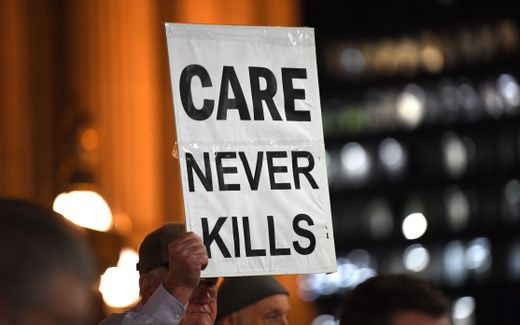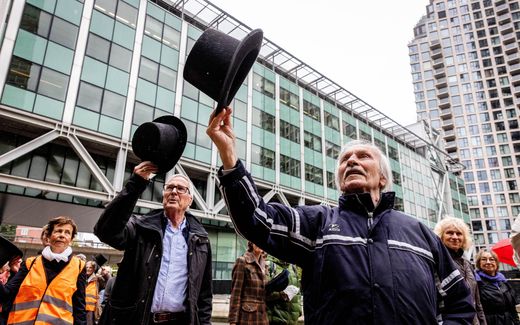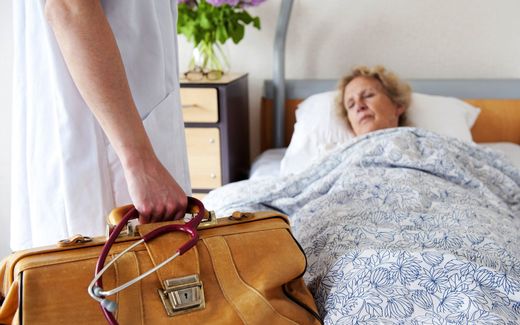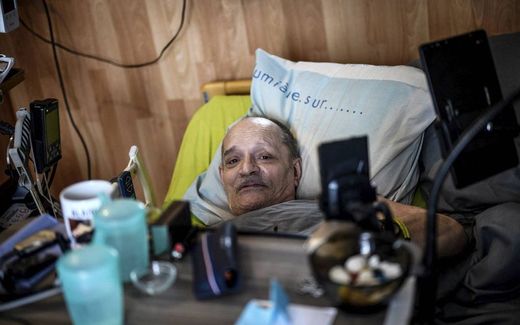Selling of suicide drug puts society in danger
17-08-2023
Opinion
Diederik van Dijk en Yvonne Geuze-van Horssen
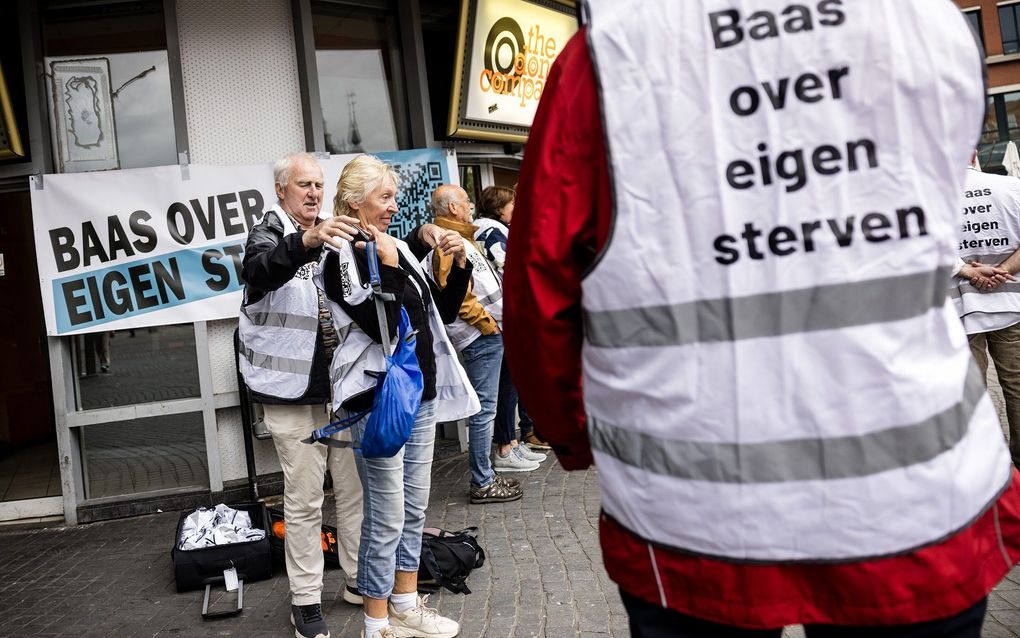
Demonstrants show support to Alex S. who was found guilty of assisting others in committing suicide. He sold poisonous drugs to people with a death wish. This is illegal in the Netherlands. The banners read "Boss over own life". Photo ANP, Rob Engelaar
Opinion
Is it an act of compassion to supply a suicide drug to people who no longer want to live? The Dutch organisation NPV – Care for life strongly opposes this suggestion. The recent conviction for distributing suicide drugs was justified, they say.
To prison for 3.5 years. That was the judge’s verdict for Alex S. on July 18th. He sold approximately 1600 packages of suicide drugs. Remarkably, the convict sold this ‘substance X’ to anyone who wished to have it, without asking any questions. He believed that anyone should be able to end their own life by means of a suicide drug.
‘Substance X’ is not illegal, nor is possessing the substance. It is generally used by chemical industries, for instance. If someone supplies the substance to people to end their lives with it, however, this is regarded as “assisted suicide”, which is a crime.
Edges of the law
Several surviving relatives of those who have bought the suicide drug are upset. They find it incomprehensible that their loved ones had access to the deadly substance.
However, other people share the same ideals as Alex S., such as the people behind the Co-operation Last Will (Coöperatie Laatste Wil), who aim to provide their members with a suicide drug. They seek several ways to achieve their goal, only just within the boundaries of the law. The most transparent way is lobbying for the law to be changed. Knowing that distributing suicide drugs is prohibited, they spread information about the drugs, for instance by sharing where they can be bought, and which ones are “safe”. The criminal records indicate that Alex S. has been used by the co-operation as an instrument to achieve the organisation’s goals. The organisation believes that everyone should be able to decide when they want to die. To them, physical condition and age are irrelevant factors.
Self-determination or a threat?
But their ideology is a dangerous one. Ever since the Co-operation began to give publicity to the drug in 2021, there has been a striking increase in its use. And despite their presentation of the drug as a humane suicide substance, the Dutch National Poison Information Centre states that in many cases, the substance does not lead to a humane death. It is yet unclear how the poison exactly works.
Advertisements of the Co-operation Last Will show fresh-looking, autonomous ‘baby-boomers’ who presumably wish to end their lives. But in reality, the more vulnerable people are the ones in danger. For instance, consider people who are so desperate from loneliness or financial concerns that they would rather die. Or consider 28-year-old Marjolein who, after receiving information from the Co-operation, impulsively took substance X. She regretted taking the suicide drug, but it was already too late.
The road to a more careful practice
Death can never be for sale, because life is too sacred. In The Netherlands, only doctors are allowed to carry out assisted suicide and euthanasia, and only if six conditions for due diligence are met. Important criteria are that someone has to be suffering unbearably and without any prospect of recovery, and that the request for euthanasia was done on a voluntary and well-informed basis, after ample consideration.
Without scrutiny, assisted suicide is high-risk: who can guarantee that the substance is not bought to take someone else’s life? Who ensures that the powder is taken voluntarily and after ample consideration? Regardless of our views on euthanasia law in The Netherlands, a route to assisted suicide besides the current euthanasia practice, undermines the current practice, which aims to be extremely careful.
Rightfully so, the government has made a covenant with suppliers of substance X which states that they will not deliver the substance to individuals. All legal opportunities must be used to act against Co-operation Last Will luring people into ending their lives. The question is whether the maximum punishment of four years in prison is suitable in this case. And how should the government react towards Co-operation Last Will, that encouraged Alex S. to distribute substance X. The fact that 1600 packages with a suicidal drug are now circling within the population is dangerous and troubling. Where are these deadly substances and who have access to them?
Accomplished life
It has often been said that people have no choice but to use substance X because there is no other humane solution for people who are ready to end their lives but do not meet the requirements for euthanasia.
But we should not turn things around. It would be unwise to implement a law for assisted suicide for people who consider their lives complete, only to prevent the use of substance X. The reasons why such a law has not been implemented are legitimate. Scientific research in 2020 bundled the testimonies of people with a death wish and showed that this is not a healthy demographic, but a group of people who suffer. Within the context of less-than-optimal mental health care and nationwide increases in loneliness, it is heartbreaking that some people have lost all perspective in life. Legislation that gives the suggestion that people –for instance older than 75– could consider assisted suicide, has a stigmatising effect and can cause people to feel unsafe or obsolete. Instead, it is necessary to find solutions within the social domain that help to diminish or even remove feelings of a “accomplished life”.
Admittedly, this is still no answer to the request of the (small) group of autonomous ‘boomers’ who want the government to legitimise their chosen deaths. We need for them to have sympathy for the task the government has to protect its citizens. Solidarity cannot be enforced, but it is important to realise that none of us are truly autonomous individuals, but people who live alongside other people. That’s why it is essential for the government to remain on the side of life, as a matter of principle. That makes the sentencing of Alex S. a very justifiable step.
Diederik van Dijk and Yvonne Geuze are, respectively, director and policy advisor at NPV – Zorg voor het Leven and a Dutch version of this article has been published on the website of ‘Katholiek Nieuwsblad’ on July 24, 2023
Related Articles

